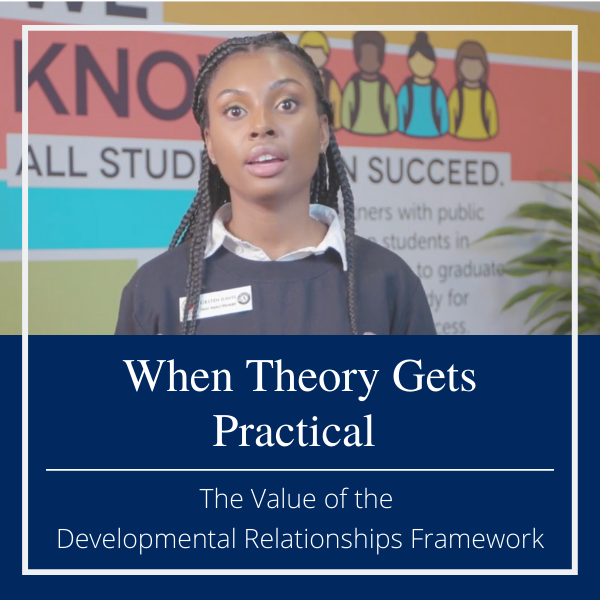Blog
Reframing Adult-Youth Relationships
It’s almost a throwaway line to say, “It’s all about relationships.” We use it to sell cars, computers, and coffee. We train doctors and nurses to work on their bedside manners. We script call center operators to make sure even unhappy customers “have a nice day.” Teachers attend in-service workshops to be inspired to connect with students. Basketball stars make commercials to entice fans to mentor youth.
And yet, when we ask people on the street about the roles that adults play in teenagers’ development (which Search Institute commissioned FrameWorks Institute to do; see display), most see little if any meaningful role. Most Americans believe kids are parents’ responsibility, and if parents mess up, adults can be “caring,” but that’s about it.

Those attitudes stand in sharp contrast with a large and growing body of research showing the power of deep, multi-dimensional relationships for young people’s development.
We also have compelling evidence that these relationships can play vital roles in healing from trauma, resilience, academic learning, social-emotional development, and multiple area of thriving.
Furthermore, there’s emerging evidence that relationships are the “active ingredient” in effective programs for children and youth. Yet we rush passed relationships to purchase the latest packaged solution, and we increase class sizes to cut costs. And we wonder why outcomes don’t improve.
Relationships matter. But we don’t seem to really believe it. We mostly don’t invest in relationships individually, as a society, or even in the institutions dedicated to the young. We’re left with at least three challenges if we are to grow the deep relational roots young people need to be resilient and successful:
- We must reframe the conversation with adults and youth so that they see themselves as not only having a stake in young people’s success, but also seeing themselves as part of the solution.
- We must innovate, improve, and share relational practices within and across settings that serve young people, reinforcing the multi-dimensionality of relationships and the complementary roles that many people in young people’s lives play in cultivating those relationships. Search Institute’s framework of developmental relationships seeks to articulate five elements of relationships in a way that it accessible and relevant to many different relationships.
- We must reimagine the role of technology, programs, and policies as reinforcing relationships rather than replacing or undermining relationships. How can our programs and curricula be designed in ways that scaffold relationships, increasing our capacity to be intentional and inclusive in how we build the kinds of relationships that all the young people need to grow up successfully?
Each of these challenges is, in itself, daunting. And yet, many leaders in many fields have laid the groundwork. Furthermore, many cultures around the world have much to teach us from the individualistic, competitive Western mindset. In this time of social fragmentation, isolation, and divisiveness, there is a readiness—even an urgency and yearning—for authentic relationships and meaningful connections. Perhaps the time is now.



